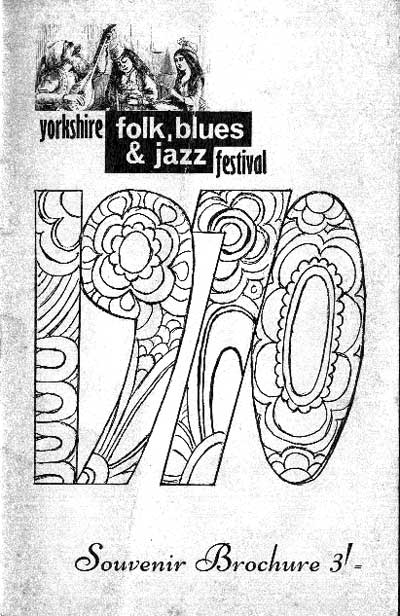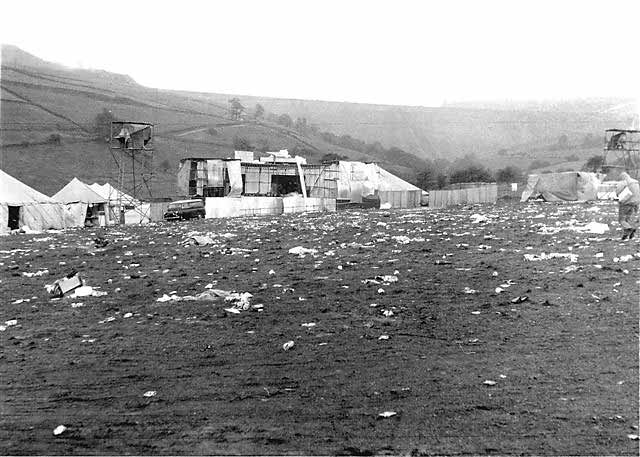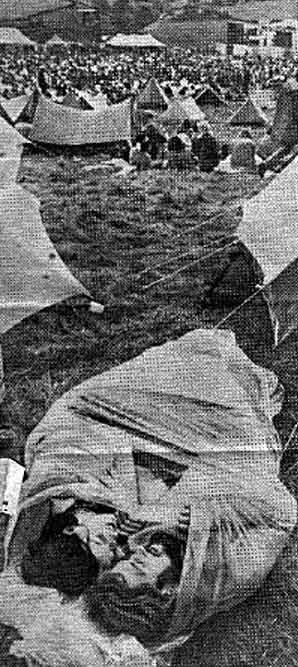 |
We were told that the management, Derek McEwen and Brian Highly, were
very keen that Civil Aid should help. They were catering for 15,000
to 20,000 people, but if it was a great success, there might be up to
50,000 there. This would put a terrific strain on the organization,
and they would be very glad if Civil Aid could provide field telephone
communications around the site for them, help the St. John and Red Cross
with First Aid if needed, and be prepared to do emergency feeding if
the commercial caterers ran out.
We had got promises
of help from several of the Yorkshire Civil Aid units, and could cope
with the communications and first aid, although they were a bit short
of field cable, but they had no-one who could do emergency feeding,
and could Rochdale help out on this one. Rochdale being in the North
West region, it would be a good opportunity to practice cooperation
between Regions.
The Rochdale Civil
Aid Treasurer, Ernie Flaherty, went over to the next meeting, and agreed
that Rochdale could provide 5,000 portions of soup and bread if the
management would advance the money to purchase it. We only had one Soyer
boiler at the time, and to do 5,000 portions in 24 hours or so, really
needed a second, so he went to Lytham St Annes and bought another.
The cheque for £80
to buy soup powder and bread arrived just in time to get the food before
the festival, and an advance party from Rochdale went over the Krumlin
on Friday. They found that the Huddersfield, Bradford, Leeds and Sheffield
Units were there, and had been spending their evenings all week laying
cable round the site. The portable switchboard was in the stone barn
attached to the farmhouse, north country fashion, at the top of the
site, and this barn was being used as Civil Aid Headquarters, although
the management had provided a small tent, a 10ft marquee down at the
bottom, near the stage, beside the other service tents for Police, First
Aid, Release, Church, and so on.
The very first task
Civil Aid had been asked to perform was to provide telephone communication
between the Police Wireless caravan up the hill in the Car Park, to
the Ambulance Service temporary station in an old mill at the very bottom
of the hill. And what a hill it was. The site was a typical Pennine
hill farm, on steep hillside, with a narrow winding lane coming in at
the top,no proper road down through the fields, only a path that would
be suitable for pack ponies in dry weather. The land was infertile boulder
clay, in an area of high rainfall, where every valley has its reservoir
to feed the neighbouring industrial towns. This valley had just had
a new reservoir built, the Scammonden Dam, that combined the reservoir
with a viaduct for the Lancashire Yorkshire Motorway, M.62 |
At the bottom of
the farm, at the end of a new road that had, been built on the line
of a former farm track was the scaffolding stage, backed by caravans
for use by the management and as dressing rooms for the groups, and
stretching up the hill towards the farmhouse at the top was the arena
for the fans, who could sit on the hillside in the manner of a Greek
theatre. The perimeter was fenced off with scaffolding and chain link
netting, and around the edges were marquees for selling food and beer
and jewellery, candles, 'underground' magazines, camping equipment.
In a field alongside the arena was the main camping area, already covered
with tents. There seemed to be several thousand there already, and the
staff of stewards and so on were very busy. A11 the staff and management
were following the hippy convention of jeans and tie-dye tee shirts
and long hair.
Given a site on a
hill farm, which proved to have been unwise, the management had planned
very well to meet every contingency. They had a water supply feeding
large tanks they, had bucket latrines in marquees sited close to hard
roads where they could be emptied by the local council tank carts, they
had a good supply of electricity, they had field telephones, they had
a hospital tent with a large staff of volunteers manning it, the ambulance
service were standing by down the hill, there were police from all over
the Ridings of Yorkshire. They did not foresee the terrible weather
that was to hit them, but such weather was exceptional for August, even
in the Pennines. When it came, the services and the voluntary organizations
were just able to prevent loss of life. But there were plenty of inconveniences.
The toilet tents were a long way from the first aid and civil aid tents.
The arrangements for feeding the voluntary staff were most unsatisfactory
they were to buy their own food and claim compensation from Northern
Entertainments afterwards, instead of being supplied with a free meal
pass as had been arranged. The marquee for Civil Aid was already too
small. We were able to remedy some of these faults with the main Civil
Aid party that arrived on Saturday.

The site on Sunday |
Civil Aid split into
three shifts so that we could give continuous coverage, manning the
switchboard and so on, Duty shift, stand-by shift and off-duty shift,
who would only be called in an emergency, each shift lasting four hours.
We found that the
field telephones could only be operated effectively if we placed a Civil
Aid member at each as operator—if we did not, either there was
no one there when a call was made, or someone would pick up the phone
but not realise that it operated on a pressed switch and so could not
make himself heard. As a result of this policy of supplying operators
we were able to keep effective communications throughout the duration
of the festival, but it strained our resources of manpower, and during
the night we withdrew most of our operators.
During Saturday afternoon
a crisis of management developed. This was mainly due to inadequate
financial arrangements. As much of the ticket money was held by ticket
agencies, there was not enough ready cash to meet all the needs. A couple
of cheques bounced, and the Groups lost confidence in the managements
ability to pay them, and one or two insisted that they would only appear
if they were paid cash, and there was not enough cash. There were delays
and arguments. One of the two organizers of Northern Entertainments
disappeared, last seen walking over the moors in a daze, the other collapsed
under the strain, and was out of action for several crucial hours.
But as so often happens
during a time of crisis, fresh leaders emerged, and these formed themselves
into a new management. They were Huw Price, the site foreman, John Gawkroger
who had come in at the last moment to oversee the ticket sellers, Brian
Wickham, who had the beer tent concession, and4, Les Allen, an agent
from London, who knew all the groups. Between them, informally, they
decided that the show must go on for the sake of the thousands of kids
who were now there, having travelled from all over Europe, Africa, America,
as well, as England, Scotland and Wales. Brian advanced money from his
bar takings to meet certain immediate expenses, John used the money
from the gate to pay the Groups travelling expenses:: and hotel bills,
Huw paid the stewards enough to be able to eat (some of this coming
from the sale of programmes in the arena by Civil Aid members who were
aware of the situation and were doing what they could to help so that
the show could go on,) Les contacted Groups managers by telephone, including
those still in London, and persuaded them to appear for expenses only
on the following day. Ginger Baker in fact turned up on the Sunday to
play free of charge, not even asking for his expenses , but by that
time the festival had been abandoned.
This new management
tackled the whole situation and solved every problem as it arose; problems
were continuous, varying in size from peanuts to mountains. By dark,
confidence had been restored among the groups and the staff, and the
future of the festival was assured- it was expected to at least break
even as a result of Sunday ticket sales, with the faint possibility
of a large profit. One of the major problems had been forged tickets
that had been spotted at the gates—the gang involved in the forgery
were located and checked, but this had a disastrous effect on ticket
receipts.
At about midnight
the Groups stopped playing for the night there had been some heavy showers
and there was a rash of short circuits on the stage, where the loudspeaker
system had an output of about 2,000 watts. A discotheque continued in
a huge inflatable tent near to the Civil Aid tent. |
I had gone off duty
at 10 pm and climbed into a sleeping bag in a tent belonging to Ernie,
our Treasurer . I had been vaguely aware that the Groups had stopped
playing, and although half asleep at the time, heard the Discotheque
stop and then the huge electric fan that kept the tent inflatable stopped
too. Soon after, as the tent deflated, it could be heard flapping in
the wind, which was rising, and presently there was very loud crack,
like a whip crack, as the dome was caught by the wind and then collapsed
. I had heard rain on the side of the tent, and had wondered about the
campers, many of whom had only a plastic bag that they had climbed into
in the arena, or nothing at all for shelter.
We were woken by
the Duty shift at quarter to two and warned that the weather was getting
worse. As we came on duty, the arena was beginning to clear, and campers,
already very wet were looking for shelter pushing into the marquees
or standing on the lee side out of the driving rain. The rain started
to get really heavy, and the flow of campers looking for shelter increased.
Ernie, who was shift leader, decided that the soup might be needed,
and got the Soyer boiler going. The only fuel that could be found to
light it in the wet and dark was the poles of the collapsed marquees
(one had gone down already), so they were chopped up, and the fire lit,
the water brought to the boil' the soup powder lit. While this was being
done I went round the whole site, checking on what food was available.
There were only four hot-dog stalls and a milk bar, none cheap.
I checked with St
John and Release, both of whom we had already found most co-operative,
and found that they were beginning to get worried about cases of exposure.
So Civil Aid said 'Right. Free soup for all who need it. Keep them warm.'
As soon as the first 5 or 6 gallons was ready we carried it to the Release
and First Aid tents in jugs, and as we did this, the situation got worse
and worse, more and more campers crowding into every space they could
find. The First Aid parties started to find cases of serious exposure,
people so cold that they could not even lift a plastic cup to their
mouths, cases who had to be carried to the marquee on a stretcher. The
ground became mud, everyone was slipping and sliding on the steep hill,
tents started to blow down, plastic sleeping bags were caught in the
gale and wrenched across the ground, scores of people were huddled in
the mud in the lee of the marquees. Civil Aid members were carrying
soup round in anything they could find, dixies, plastic jars - we even
emptied beer and cider out of the plastic gallon jars to carry soup
instead.
At about 4 a.m. there
were two ad hoc conferences in progress, one between the County Ambulance
Officer in charge of the temporary Ambulance station below and the St.
John personnel, who were trying to predict which way the emergency was
likely to develop. The other was between St. John, Release and Civil
Aid, to try to organize additional shelter. The only practical solution
was the beer marquees, but these were closed and guarded by employees
who, quite rightly, would not allow
stray campers in. So George Graham, of Release, got one of the Release
doctors and to go to the Police and persuade them that these marquees
must be requisitioned to prevent loss of life. There were by now very
large numbers of exposure cases being brought in to be treated, many
had already gone to hospital by ambulance.
It was not easy to
get a decision to requisition from the Police. It is a built-in feature
of the Police Force that they do not make independent decisions—they
always consult higher authority, unless it is in the book. Only a Chief
Constable will readily act on his own initiative. Disaster conditions,
although part of the police task, are met with so infrequently that
they are outside their normal experience.
However, by insistence,
the Release doctor managed to get through to the senior Police Officer
on duty, and he authorized the sergeant present to open the beer tents.
Once the decision had been taken, it was very simple. The sergeant simply
demanded to be let in and said ‘We propose to requisition this
tent , will you co-operate?' He got immediate co-operation, and in turn
agreed to leave a constable to prevent any looting. Civil Aid was also
to leave a member to help the campers, and at first only real exposure
cases were let in. But very soon everyone who was out in the open became
an exposure case, and anyone needing shelter could go in. This very
large, in fact double' marquee just succeeded in taking the people still
left outside. There was not one single case of anyone trying to take
a free drink. The behaviour of the 15,0004 campers was of the highest
order, with two exceptions.
The first of these
was an attempt to extort money from traders by threats, at about dusk
on Saturday night. The second was the three or four drug cases arrested
(although rumours were circulating that over one hundred had been 'busted'
by the ~ police—but this was rather indicative of the ill feeling
that existed for the police). In one of these cases the man arrested
was very roughly handled by the police—he was 'high'. There was
a very strong protest by Release' one of whom had witnessed the arrest.
Police behaviour after that was perfect , but it did not help the feeling
of resentment the two philosophies of hippy and police being to an extent
incompatible. It would have done a great deal to improve relations permanently
if police had physically helped to carry and distribute soup, so that
they could have been seen to be concerned with the welfare of the campers.
Many people were seen to help, but they were anonymous. One helper in
particular must be singled out -a male nurse from Lancashire who worked
throughout the night with the Civil Aid volunteers. At the time I thought
he was a member of one of the Yorkshire Units of Civil Aid.
Shortly before dawn
the pressure had become so great that all the off-duty shift of Civil
Aid had been called out, and it was soon after this that the gale returned
with renewed violence and marquees and tents collapsed, including the
beer tent crowded with campers, watched over by a member of Civil Aid.
Huw Price was at this time trying to get riggers in to reinforce the
guys of the marquees, but this was not easy on a Sunday morning, and
they did not arrive in time to save the tents. With the dawn the problem
started to ease, as people came to life in their plastic bags and started
to move about and warm up. The number of fresh exposure cases slackened
off and some people started to climb the hill to leave the site.
At about 6 a.m. there
was a quick meeting of the new management to discuss the situation and
see if it would be possible to continue. At that time the word was passed
round that it was intended to continue with the day's programme, if
later circumstances would permit. By now there were queues of people
forming at the Soyer boiler beside the Civil Aid tent,and the second
boiler that had been operating up at the farm was brought down to the
centre of the site. At about 7 a.m. Ernie collapsed from the strain
he had been working under. A doctor from Release quickly got him away
to hospital, with his daughter Lesley, who had gone off duty after the
beer tent had collapsed over her head. |
 |
At a little before
8 a.m., the management all got together at the farm, went to see the
Police, decided that the stage was no longer safe, that the show could
not possibly go on, so the festival was called off. Although at this
time the weather was looking better and there was a good forecast, it
was a wise decision, because the wind rose again, most of the remaining
tents collapsed, there were frequent heavy showers, and a retaining
wall in the farmyard collapsed.
Campers were streaming
off the ground, and the Police got in touch with the Bus Company to
get the special evening service brought forward to deal with them. The
medical and First Aid teams were still under heavy pressure and the
ambulances were kept busy until mid afternoon moving hospital cases
that were carried over the mud in mountain rescue sledges. Teams from
Bradford, Leeds and Huddersfield Civil Aid came in and took over from
those who had been on duty all night, who managed to get a snack and
a few hours rest. By early afternoon there was no real problem left
to deal with and the Civil Aid party went home, returning during the
week to reel in field cable lines.
70 extreme exposure
cases had been sent to hospital, and 330 treated in the First Aid tent.
It took me about two days to recover physically from Krumlin, and then
another three to get some of the loose ends sorted out, especially the
financial ones. We were about £200 down overall, including nearly
£150 for the Rochdale Unit, whose cheque for the purchase of soup,
cups and bread had bounced.
Contact
us if you can help.
Back
to the main Archive
|
